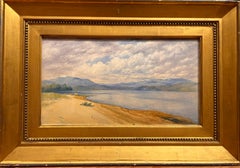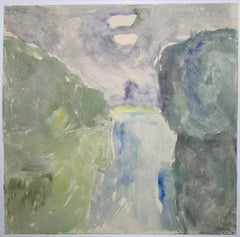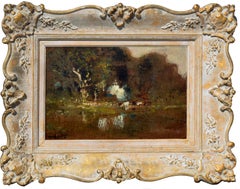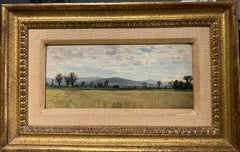John Henry Hill Paintings
to
1
Overall Width
to
Overall Height
to
1
1
1
1
1
4
779
726
723
683
1
1
Artist: John Henry Hill
Landscape of Summer At Lake George, NY
By John Henry Hill
Located in Fredericksburg, VA
John Henry Hill was a distinguished landscape painter and engraver of the American Pre-Raphaelite tradition. A lifelong resident of West Nyack, New York, John Henry Hill was influenc...
Category
Mid-19th Century Pre-Raphaelite John Henry Hill Paintings
Materials
Paper, Watercolor
Related Items
Russian Landscape (abstract painting)
Located in Wilton Manors, FL
Yuri Larin (1936-2014). Landscape, 1986. Watercolor on paper, 16.5 x 17 inches. Mounted on cardboard sheet measuring 24 x 28 inches. Signed and dated lower left. Excellent condition. Image is painted on verso side of block print wallpaper...
Category
1980s Abstract John Henry Hill Paintings
Materials
Paper, Watercolor
Cattle By Pond At Dusk, Mid-19th Century Tonalist Landscape by William Keith
By William Keith
Located in Soquel, CA
Cattle By Pond At Dusk, Mid-19th Century Tonalist Landscape by William Keith
Gorgeous mid-19th century landscape painting by William Keith (American, 1838-1911), circa 1860. This impressive Tonalist landscape, titled "In the Woods", depicts cattle beside a pond in the forest at dusk. Keith uses loose, blended brush strokes and a muted earthy palette to create an atmospheric mood that Tonalism is known for.
Signed "W. Keith" lower left.
Museum label on verso from Santa Barbara Museum of Art.
Presented in an antique giltwood frame.
Image size: 9"H x 13"W. With frame measures: 16"H x 20"W x 3"D.
Provenance:
Mrs. Eugene Patterson; Santa Barbara Museum of Art.
Authenticity guaranteed and certificate include.
Condition:
Very good. Cleaning and restoration required signature to be re-touched, original images pre-restoration available.
About the Artist:
Brought to New York City in 1850, William Keith was apprenticed to a wood engraver in 1856 working for "Harper's" magazine. In 1858 (or 1859) he visited California for "Harper's" and then after a trip to Great Britain, settled in California as an engraver in 1862. He began exhibiting paintings in 1864 in San Francisco where he opened his studio, after having been taught painting by his wife.
The Northern Pacific Railroad...
Category
1890s Pre-Raphaelite John Henry Hill Paintings
Materials
Oil, Illustration Board
$2,887 Sale Price
25% Off
H 16.25 in W 21.5 in D 3 in
Diana Nemorensis - 19th Century NeoClassical Oil Painting Ancient Roman Goddess
By Max Nonnenbruch
Located in Gerrards Cross, GB
‘Diana Nemorensis’ by Max Nonnenbruch (1857-1922). The painting – which depicts the Roman Goddess Diana of the Woods beside Lake Nemi – is signed by the artist and presented in a fin...
Category
Late 19th Century Pre-Raphaelite John Henry Hill Paintings
Materials
Oil
$15,584 Sale Price
40% Off
H 42 in W 30 in D 3 in
Woodland Interior
By William Trost Richards
Located in Bryn Mawr, PA
Woodland Interior
Oil on canvas
21 7/8 x 14 3/4 inches (55.6 x 37.5 cm)
Framed dimensions: 32 7/8 x 26 inches
Signed lower left: Wm. T. Richards
Provenance
The artist;
James Bayard ...
Category
Mid-19th Century Pre-Raphaelite John Henry Hill Paintings
Materials
Canvas, Oil
Whitehall Building, July 1939 - Harbor Seascape with Tugboat in Watercolor
Located in Soquel, CA
Whitehall Building, July 1939 - Harbor Seascape with Tugboat in Watercolor
Detailed harbor landscape by Ernest Clegg (British, 1876-1954). The Whitehall Building towers over the sce...
Category
1930s Impressionist John Henry Hill Paintings
Materials
Paper, Watercolor
$1,850
H 20.5 in W 26 in D 0.75 in
Hermosa Beach Coastline - Watercolor On Paper
Located in Soquel, CA
Hermosa Beach Coastline - Watercolor On Paper
Watercolor painting depicting the Hermosa Beach coastline by California artist F.J. Whitlock (American, B- 1923 ). Vibrant hues of blue...
Category
1940s American Impressionist John Henry Hill Paintings
Materials
Paper, Watercolor
Antique American Realist Harvest Landscape Painting Bucks County Pennslyvania
By Frank F. English
Located in Portland, OR
Antique American watercolor painting, landscape harvest farm scene by Frank F. English (1854 - 1922), Bucks County, Pennsylvania, Circa 1900.
A very attractive painting by the celebrated Pennsylvania artist Frank F. English, the location is in Point Pleasant, Bucks County, Pennsylvania. The painting depicts a scene of blue skies with two farmers tossing hay with pitchforks & two horses harnessed to a hay wagon, with barns to the background. The painting signed lower right " Frank F. English", condition is excellent this very charming painting is ready to hang on your wall.
Biography
Frank F. English was born in Louisville Kentucky in 1854. In the early 1880s, he studied for five years in the evening classes of the Pennsylvania Academy of the Fine Arts. His instructors included Thomas Eakins, James P. Kelly and Thomas Anshutz.
However, English's reputation primarily rests with his outstanding facility as a watercolorist; most of his known paintings are executed in this medium. English's propensity for its use coincides, appropriately enough, with the watercolor's growing popularity among other American painters.
The American Water Color Society brought the medium special prominence by the late 1860s, and acceptance on the level of oil painting in 1876. That same year, the society was invited to display its works at the Philadelphia Centennial Exposition. Its members exhibited 116 watercolors, and their public exposure was enormous. It is safe to assume that during the 159-day Centennial, Frank English was among the nearly 10 million exposition attendees, surpassing attendance records at all preceding world's fairs.
At age twenty-two, English, traveled to Philadelphia to see works by the Society's notables such as Samuel Colman, R. Swain Gifford, Louis Comfort Tiffany, Albert Fitch...
Category
Early 1900s American Realist John Henry Hill Paintings
Materials
Paper, Watercolor
$5,500
H 23 in W 33 in D 1.75 in
Continental School, Woman with Doves
Located in Astoria, NY
Continental School, Woman with Doves, Oil on Canvas, unsigned, wood frame.
Image: 57.75" H x 33.5" W; frame: 60.75" H x 36.5" W x 0.25" D.
Provenance: From a Cobble Hill, Brooklyn ...
Category
20th Century Pre-Raphaelite John Henry Hill Paintings
Materials
Canvas, Oil
Mother and Child
Located in New York, NY
Watercolor on paper laid on board: An exceptional watercolor in terms of quality and presentation. During this earlier period of Day's career he exhibited extensively and was inspir...
Category
1910s Pre-Raphaelite John Henry Hill Paintings
Materials
Watercolor, Board, Archival Paper
Walter James - British Pre-Raphaelite landscape oil of Sheep on the Moor
Located in London, GB
WALTER JAMES, 3rd BARON NORTHBOURNE
(1869-1932)
Cheviot Ewes and Lambs on the Moor in Early June
Signed and dated l.l. WALTER JAMES 1920; signed, inscribed with title and the artis...
Category
Early 20th Century Pre-Raphaelite John Henry Hill Paintings
Materials
Oil
Rare Hand Colored "Cabane Des Hold" - 1st Ed "Description de l’Univers" C. 1683
By Alain Manesson Mallet
Located in Soquel, CA
Rare Engraving "Cabane Des Hold, Terres Artiques, Fig CII," 1st edition "Description de l’Univers, page 281
This rare image depicts the Willem Barentsz expedition of 1597 to Novaya Zemlya, Russia. The engraving, with later hand-coloring, shows the cabin and ship of the Dutch arctic expedition of Barentsz on Novaya Zemlya (Nova Zembla), with the party being attacked (and in some cases apparently eaten) by bears and wolves. Dutch explorer, Willem Barentsz, reached the west coast of Novaya Zemlya in 1594, and in a subsequent expedition of 1596 rounded the northern point and wintered on the northeast coast. Barentsz died during the expedition, and may have been buried on the northern island.
This artwork is a page from a book by 17th century cartographer and engineer, Allain Manesson Mallet (French, 1630-1706), "Description de L'Univers, contenant les differents systêmes du monde, les cartes générals et particulières de la géographie ancienne et modern." Paris: Denys Thierry, 1683.
Presented in an cream colored mat.
Text on verso shown in images.
Mat Size: 11.5"H x 9.07"W
Paper Size: 8.25"H x 5.44"W
Image Size: 5.63"H x 3.75"W
Alain Manesson Mallet (French, 1630-1706) was a 17th century cartographer and military engineer. He started his career as a musketeer in the army of Louis XIV, became a Sergeant-Major in the artillery and an Inspector of Fortifications. He later served under Alfonso VI, King of Portugal...
Category
1680s Realist John Henry Hill Paintings
Materials
Paper, Ink, Gouache
$475
H 11.5 in W 9.07 in D 0.07 in
Abstract Expressionist Landscape Jay Milder Rhino Horn Painting American Pop Art
By Jay Milder
Located in Surfside, FL
This came from the collection of the Horace Richter Gallery, Old jaffa, Israel
These were done in the 1990's
Hand signed and dated. titled Old Jaffa.
Jay Milder (born 1934) is an Am...
Category
20th Century Abstract Expressionist John Henry Hill Paintings
Materials
Paper, Gouache
Previously Available Items
1857 American Hudson River Rockland County Landscape Painting KENNEDY Gallery
By John Henry Hill
Located in New York, NY
John Henry Hill
1839-1922
Signed lower right
Dated: 1857
Sight size: 3 3/4 x 7 1/2 inches
Overall size: 7 3/4 x 11 1/2 inches
oil on panel
Good condition
Kennedy Gallery Label Verso
...
Category
1850s Hudson River School John Henry Hill Paintings
Materials
Wood Panel
H 7.75 in W 11.5 in D 3 in
John Henry Hill paintings for sale on 1stDibs.
Find a wide variety of authentic John Henry Hill paintings available for sale on 1stDibs. You can also browse by medium to find art by John Henry Hill in paint, paper, watercolor and more. Not every interior allows for large John Henry Hill paintings, so small editions measuring 19 inches across are available. Customers who are interested in this artist might also find the work of and Francis Plummer. John Henry Hill paintings prices can differ depending upon medium, time period and other attributes. On 1stDibs, the price for these items starts at $22,000 and tops out at $22,000, while the average work can sell for $22,000.



